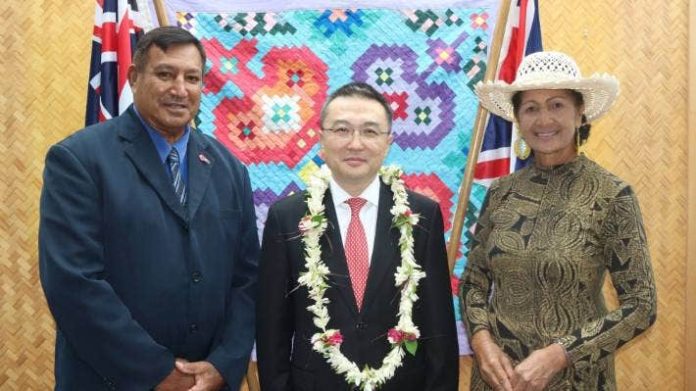China’s special envoy to the Pacific, Qian Bo, has met with Cook Islands Prime Minister Mark Brown who is also chair of the Pacific Islands Forum, amid growing concerns over the Chinese government’s latest security pact with the Solomon Islands.
Solomons Prime Minister Manasseh Sogavare and his Chinese counterpart Li Qiang signed several deals in Beijing last week, including a policing implementation plan and comprehensive strategic partnership, which would allow Chinese police presence in Honiara until 2025.
Forum members New Zealand and Australia have expressed their concerns at the new agreement off the back of a security pact sealed in April last year which allows Sogavare to call on China at any time for assistance.
Both Aotearoa and Australia have called on Beijing and Honiara to reveal the details of the new deal.
New Zealand said it was concerned Pacific island nations and organisations were “facing pressures” from a more assertive China, and the forum should continue to prioritise the security of its member states.
Prime Minister Chris Hipkins told a meeting of NATO leaders in Lithuania last week and the China Business Summit in Auckland on Monday that Beijing’s increasing assertiveness was impacting the geopolitical change and competition in the Pacific.
Hipkins also met China’s President Xi Jinping in Beijing last week, with the Chinese leader saying that “China always views New Zealand as a friend and a partner”.
The visit was the first by a New Zealand prime minister since Covid-19 and came against a backdrop of increased geostrategic competition in the region since the pandemic.
China and the U.S have been in a geopolitical power struggle for influence in the Pacific in the past two decades.
But the U.S-China competition has intensified since Beijing secured the security deal in 2022, which Washington feared would see Chinese power and presence grow in the region.
New Zealand wants transparency over China’s intentions in the Pacific including details of the recent pact with the Solomons, a spokesperson for Foreign Affairs Minister Nanaia Mahuta said.
“We would like the text to be made public in order to understand any security implications for the region.”
Sogavare switched diplomatic ties from Taiwan to Beijing when he came to power in 2019, and he has defended his government’s decision to expand China’s policing support to the Solomon Islands.
“Beijing will enhance our ability to maintain law, order, security and social stability, protecting the security and interests of all citizens of the Solomon Islands, creating a sound and stable environment for the social and economic development of the country,” he told Chinese media.
While the Cook Islands government did not release details of its discussions with Qian, it said the Chinese delegation had met with associate Minister of Foreign Affairs and Immigration Tingika Elikana and special envoy to the Pacific Islands Forum, Tepaeru Herrmann.
Qian’s office said his visit aimed to strengthen China’s relations with the Pacific Islands Forum, demonstrating his government’s commitment to addressing regional concerns and maintaining diplomatic ties.
In April, Brown hosted Chinese ambassador to the Cook Islands Wang Xiaolong and discussions involved priority co-operation and support towards economic recovery, improved interisland transport links and air connectivity.
Cook Islands will host the Pacific Islands Forum leaders meeting in November and talks are expected to focus on China, climate change, Covid-19 and Japan’s release of more than 1 million tonnes of treated wastewater from its damaged Fukushima power plant into the Pacific Ocean.
Australia has condemned the China-Solomons agreement, with Foreign Minister Penny Wong saying she would raise her government’s concerns about regional security impacts at the November summit in Rarotonga.
Wong said Forum members had agreed to look to their Pacific family first for security.
Sogavare said China had agreed to prop up his country’s troubled budget, and accused New Zealand and Australia of “suddenly withdrawing financial support worth millions of dollars” which both countries have denied.
Sogavare also criticised both countries and the U.S for condemning his policing pact with China, adding that “nothing” could stop him asking Beijing to send police to help if disorder broke out again in the Solomons.
In December 2021, riots broke out in Honiara after protesters demanded Sogavare’s resignation. New Zealand police were deployed to the Solomons to assist security personnel from Australia, Fiji and Papua New Guinea.
Sogavare called for a review last month of a 2017 security treaty with Australia, which had provided policing support to the Solomons including the 2021 riots in Honiara.
In January, Fiji’s Prime Minister Sitiveni Rabuka – a month in office – announced his government would end Chinese security work contracts in Fiji.
Rabuka said there was no need for the Chinese officials to continue working in Fiji’s police force.
“Our system of democracy and justice systems are different, so we will go back to those that have similar systems with us.”
Rabuka said officers from New Zealand and Australia could stay because “their systems are similar to Fiji’s”.
In June, Defence Minister Andrew Little and his Fijian counterpart Pio Tikoduadua signed a security agreement to strengthen military training and maritime security.
In May, Papua New Guinea signed a defence and maritime co-operation agreement with the US in Port Moresby.
PNG Prime Minister James Marape defended the deal against claims it could encroach on his country’s sovereignty after a leaked draft document suggested the agreement gave US staff and contractors legal immunity, allowing aircraft, vehicles and vessels operated by or on behalf of the US to move freely within PNG and its territorial waters.
The pact also exempted U.S personnel from PNG’s migration requirements.
SOURCE: STUFF NZ/PACNEWS













